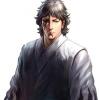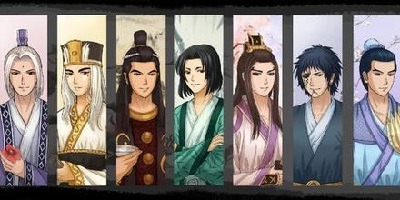
Between Process and Result
#1

 Posted 11 November 2017 - 11:09 PM
Posted 11 November 2017 - 11:09 PM

If u already read till the latest chapter (whichever latest chapter u find), I'm sure u already grasped the fight between ideology that happened here. Not only this manga talks about loyalty and bertrayal, courage and cowardice, but this manga also talks about the best way to achieve your ideals.
Although the variety of strategies that were applied to achieve the goals was very diverse, it generally can be summed into two categories: Process oriented and Objective oriented. To simplify the explanation, I will use the figurehead as the symbol of each categories. Earlier Liu Bei (remember saving Xu Province without wanting taking credit for it?) is the embodiment of process oriented. He didn't want to be tarnished by greed, cruelty, tyranny, or opportunistic behavior in achieving his goals. While Cao Cao (remember kill 200 thousands people to subdue 10 cities 'peacefully'?), will use all resources he had to achieve his goals... no matter what the cost is.
Interestingly, it also applies to their respective chief advisor. Sima Yi believes that the best way to end the war is by siding with the strongest (regardless he's evil or not) to end the war as fast as possible, n then overthrow him when the peace is attained. While Zhuge Liang oppose that way of thinking by saying that human will act as an example of other human (if u get position by overthrowing ur superior, ur subordinates will follow ur example).
My question is... which way do u tend to agree? Can u give me ur argument?
I'm sure u dear readers understand that there's no right or wrong answer here (since we all live within gray world, not black n white). But it's still interesting see how the majority of ROT fans perceive the ongoing battle, not only in strategy, but also in ideology. And I predict that the answer will differ along with the diverse background of the ROT fans (just like Sima Yi is a businessman, while Zhuge Liang is a scholar).
Don't worry, it's not a research or anything... I'm just thinking it will be nice for this series to have a simple discussion about the way each parties in achieving victories along with the newest chapter released...
Sincerely,
Renaissance
#2

 Posted 12 November 2017 - 11:46 AM
Posted 12 November 2017 - 11:46 AM

Finally, an attempt to discuss stuff (outside of the new Ravages discord server), and a more serious one too.
Where do I begin? I guess I'd first like to nuance the contrast a bit, since actions and goals are intricately connected. (1) On the one hand, there are certain goals framed in such a way that the primary means enacted to transform the current state of things would still have an important role once said goals are achieved (so for instance there are those who wish for a more virtuous and harmonious society, and so would act virtuously as a preview and sample of what the end game would look like). (2) On the other hand, there are those goals framed in such a way that they involve a violent rupture from the current state of things, as well as transitional and temporary measures meant to expedite the attainment of the goal (so for instance there are those who wish to restore order and/or institute a new political regime, and so would resort to repressive measures that would be discarded or sidelined upon completion). (3) And then there are goals framed in such a way that little concern is given to unintended consequences, so long as there is effective implementation of the agenda (I suppose if one's goal is pretty narrow, like self-preservation or self-aggrandizement, then one would have such an orientation toward methods)
Now where would I stand? It depends on the combination of goals, I suppose. It could be that one's main agenda would involve transitional measures, even as one sub-goal involves certain imperatives about processes. Or it could be that one goal has to be achieved before the other can be significantly advanced. This then leads us to a discussion as to which goals we embrace or reject in the first place... Personally I'd appreciate it if all nice goals we have are of the first type, but depending on circumstances secondary or proximate goals of the second or third type would be more feasible to take on.
Let's take for instance the likes of Liu Bei, Cao Cao, Zhuge Liang, and Sima Yi as they are interpreted in Ravages. Early Liu Bei is all about restoring the reign of Han (and promoting virtue by example, regardless of whether others would misinterpret his actions). Late Liu Bei seems to have postponed Han restoration, and has adopted as an intermediate goal the consolidation of the Liu clan under his leadership by whatever effective means (including the continued cultivation of his earlier reputation, which acts as a shield and weapon for conquest as well as a constraint to more underhanded proposals). Cao Cao's goal appears to be restoring order to the realm and paving the way for a reformed society 'in the name of Han' and under his leadership by whatever effective means (although he could also be motivated by the ambition to rule). Sima Yi is an interesting case in that his earlier proposal of propping up and usurping a hegemon counts as instrumentalist and impersonal, but ever since the massacre of the Sima clan he's also been driven by a desire for vengeance against Cao Cao and his family. Zhuge Liang I think is the most ideologically resolute of the bunch, considering that his loyalty is not even to Han per se, but to an ideal and virtuous polity of some sort (it just so happens that part of the ideal is making use of Han loyalism directed by a charismatic figure as a convenient mechanism). The crucial difference between early Zhuge Liang and late Zhuge Liang would be that the latter has added more intermediate goals before the final goal.
I hope this lengthy response stimulates rather than stifles the discussion. This other discussion attempt I made may also be of some interest.

玖琦陣謀

 Sign In
Sign In Create Account
Create Account




 Back to top
Back to top









